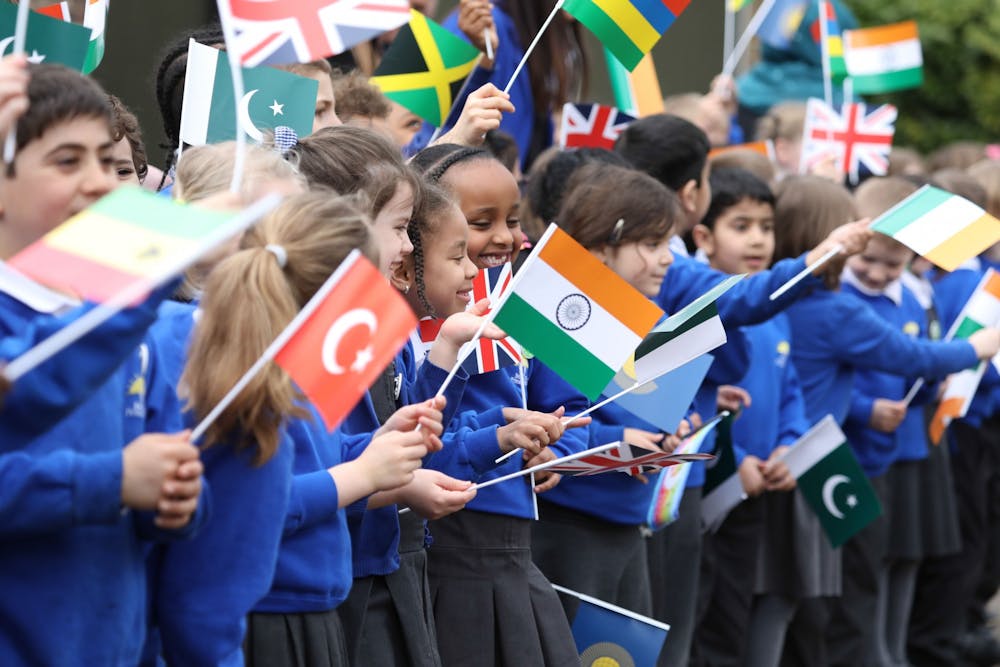The official mourning period for the British royal family, in light of the death of Queen Elizabeth II, ended on Sept. 26. As the nation returns to normalcy nearly a month later, many campus community members are reflecting on the role of the British monarchy in the 21st century.
Queen Elizabeth II died on Sept. 8 and was laid to rest at Windsor Castle on Sept. 19. The Daily Princetonian spoke with students and faculty at the University from both the United Kingdom (U.K.) and the Commonwealth of Nations. Since the queen's passing, King Charles III has assumed the monarchy alongside his wife Queen Consort Camilla.
Some community members expressed concern about the future of the Commonwealth, as well as King Charles III’s role in public politics, especially considering the global influence of the United Kingdom.
Dr. Nasser Hussain, who has worked in the British parliament, spoke to the evolving role of Great Britain in international relations. Hussain is a 2022-23 postdoctoral research associate with the James Madison Program and a lecturer in the politics department.
“We're moving into a changing world,” he said. Hussain is a Brit who currently teaches American Identity at a Crossroads (FRS105), a freshman seminar on American identity.
"The world is changing, and Britain's ex-colonies have more options as they look to build strategic alliances with countries that suit their current priorities," he added.
“[The Queen] is emblematic of certain vestiges of British imperialism,” said Alice van’t Hoff, a graduate student in the philosophy department from the U.K. “I think [imperialism] is generally on the wane.”
“I think her death and Charles’s succession will accelerate the pace of decline,” van’t Hoff added.

In reflecting on the British monarchy, some students discussed its legacy of colonialism, racism, and the exploitation of marginalized groups.
“The British Monarchy represents corruption, racism, and privilege,” Brian Mhando ’26 of Tanzanian heritage wrote to the ‘Prince’. “The monarchy only stands for exclusion. It’s not inviting to other races, other cultures, and other perspectives.”
He specifically mentioned the royal family’s hostility toward Meghan Markle, the Duchess of Sussex. Markle has publicly spoken about being “driven from the royal family because of racism,” according to TIME Magazine.
A similar sentiment was shared by Amelia Brown ’26, who is of Jamaican heritage. Throughout much of her young life growing up in England, she saw the royal family as an example of “poise, elegance, and generosity.”

But her impression began to change when she observed the royal family’s treatment of Markle prior to her and Prince Harry’s wedding in 2018.
“Their smiling faces and public days of affection towards Meghan were all acts. This was the moment I realized that the British Royals were not just some fairytale family,” she wrote to the ‘Prince.’
Isabel Matthews ’26, who is from Jamaica, shared the view that countries that are or were colonized by the British ought to steer away from idolizing the royal family.
“They don’t do much now and I don’t see them making an effort to do anything in the future,” she said.
Max Peel ’25, who grew up in England and holds dual citizenship in the U.K. and the U.S., similarly reflected on post-colonial nations’ relationships with the U.K. and its royal family.
“It’s a matter of foreign policy, and individual countries should be able to decide what relationship they wish to have with the British monarchy and state,” they wrote in a message to the ‘Prince.’
Hussain opined that King Charles III’s relationship to politics could change the role of the monarchy, given that some members of the public view him as more involved with activism, specifically environmental activism, compared to Queen Elizabeth II.
“He has various causes that he wishes to support, and that changes the role of the monarchy in politics,” Hussain said.
van’t Hoff expressed a similar viewpoint. “I am not excited. Charles is a more activist figure and less likable,” she said.
Hussain also mentioned the controversy surrounding Princess Diana’s death in 1997, and how that makes King Charles III’s legacy “somewhat tarnished.”
“[The Royal Family will] never rid themself of that horrible legacy involving Princess Diana,” he said.
After more than 70 years with Queen Elizabeth II on the throne, the U.K. enters into a new era.
"King Charles [III] has inherited the throne, but now he has to earn the respect of both his subjects at home and people throughout the Commonwealth," Hussain said.
Correction: a previous version of this article named Queen Consort Camilla with her last name from her previous marriage. The ‘Prince’ regrets this error.
Justus Wilhoit is a news contributor for the ‘Prince.’ He can be reached on Instagram @justus.equality22 or jw5572@princeton.edu.
Rebecca Cunningham is a news contributor for the ‘Prince.’ She can be reached on Instagram @rebecca.g.c or rc0270@princeton.edu.








